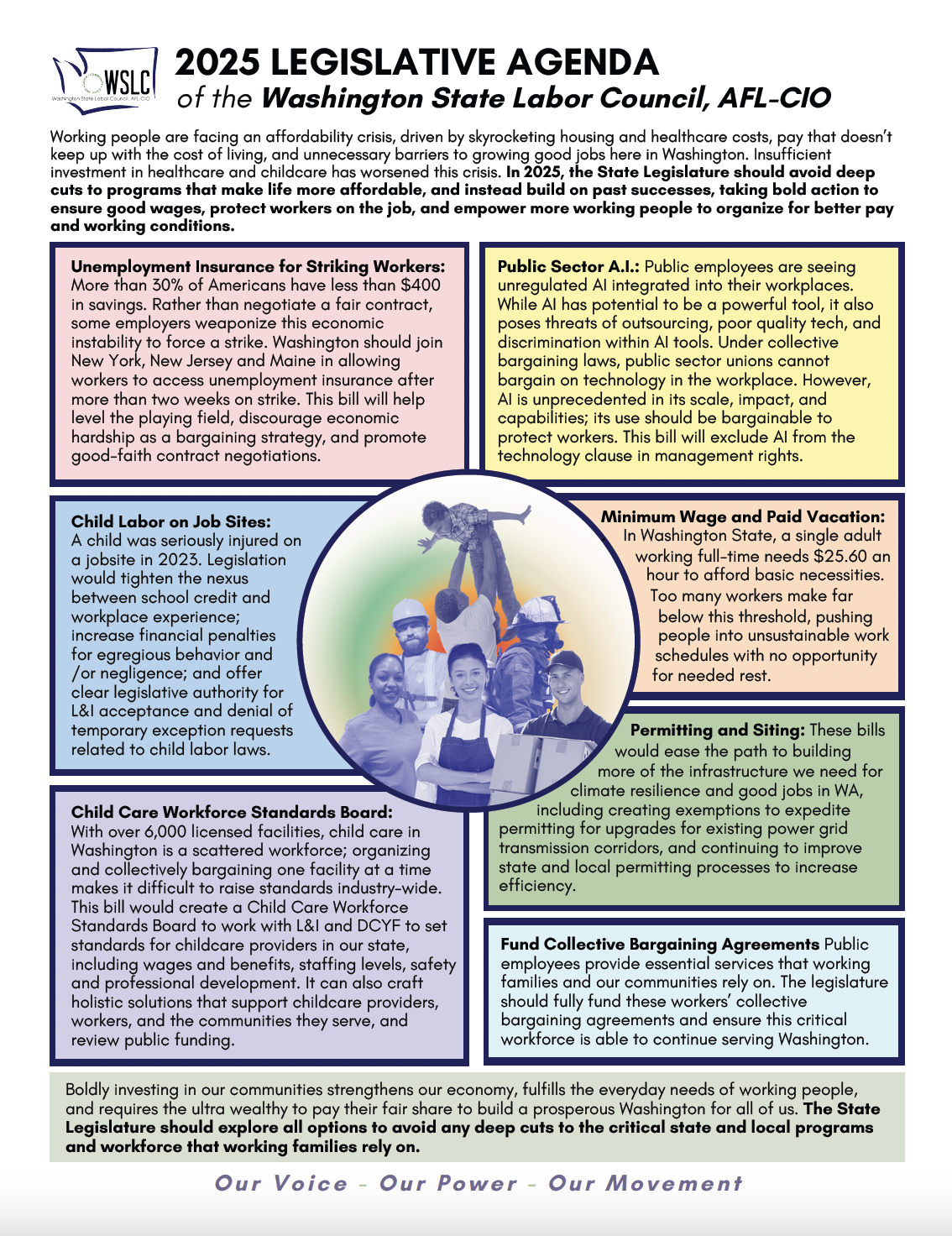STATE GOVERNMENT
WSLC’s 2025 Legislative Agenda
The State Legislature should avoid deep cuts to programs that make life more affordable and take bold action to improve quality of life for working Washingtonians
OLYMPIA, WA (January 13, 2025) — The Washington State Legislative Session convenes today, beginning a 105-day policy marathon. As the work begins, the Washington State Labor Council, AFL-CIO is supporting a comprehensive array of bills to secure pro-worker legislation that will improve jobs and quality of life for working people across the state.
This session comes at a time when working people are facing an affordability crisis, driven by skyrocketing housing and healthcare costs, pay that doesn’t keep up with the cost of living, and unnecessary barriers to growing good jobs here in Washington. Insufficient investment in healthcare and childcare has worsened this crisis.
In it’s 2025 Legislative Agenda, the WSLC is urging the State Legislature to avoid deep cuts to programs that make life more affordable, and instead build on past successes, taking bold action to ensure good wages, protect workers on the job, and empower more working people to organize for better pay and working conditions.

“Working people are struggling with the rising cost of living, and the 2025 Session is ripe with opportunities to ease this burden,” said WSLC President April Sims. “The WSLC is advocating for policies that will empower Washington workers to make their voice heard, access good jobs, and secure higher wages and better benefits.”
Among the Council’s top priorities are bills to allow striking workers to access unemployment benefits, strengthen protections for children receiving school credit for work experience, raising the minimum wage and passing paid vacation, creating a child care workforce standards board, improvements to construction permitting and siting, and empowering public sector workers to bargain over the use of AI. The WSLC is also advocating for full funding of public employee collective bargaining agreements.
Unemployment for Striking Workers: More than 30% of Americans have less than $400 in savings. Rather than negotiate a fair contract, some employers weaponize this economic instability to force a strike. Washington should join New York, New Jersey and Maine in allowing workers to access unemployment insurance after more than two weeks on strike. This bill will help level the playing field, discourage economic hardship as a bargaining strategy, and promote good-faith contract negotiations.
Child Labor on Job Sites: A child was seriously injured on a jobsite in 2023. Legislation would tighten the nexus between school credit and workplace experience; increase financial penalties for egregious behavior and/or negligence; and offer clear legislative authority for L&I acceptance and denial of temporary exception requests related to child labor laws.
Minimum Wage and Paid Vacation: In Washington State, a single adult working full-time needs $25.60/hour to afford basic necessities. Too many workers make far below this threshold, pushing people into unsustainable work schedules with no opportunity for needed rest.
Child Care Workforce Standards Board: With over 6,000 licensed facilities, child care in Washington is a scattered workforce; organizing and collectively bargaining one facility at a time makes it difficult to raise standards industry-wide. This bill would create a Child Care Workforce Standards Board to work with L&I and DCYF to set standards for childcare providers in our state, including wages and benefits, staffing levels, safety and professional development. It can also craft holistic solutions that support childcare providers, workers, and the communities they serve, and review public funding.
Permitting and Siting: These bills would ease the path to building more of the infrastructure we need for climate resilience and good jobs in Washington, including creating exemptions to expedite permitting for upgrades for existing power grid transmission corridors, and continuing to improve state and local permitting processes to increase efficiency.
Public Sector A.I.: Public employees are seeing unregulated AI integrated into their workplaces. While AI has potential to be a powerful tool, it also poses threats of outsourcing, poor quality tech, and discrimination within AI tools. Under collective bargaining laws, public sector unions cannot bargain on technology in the workplace. However, AI is unprecedented in its scale, impact, and capabilities; its use should be bargainable to protect workers. This bill will exclude AI from the technology clause in management rights.
More WSLC-supported legislation is included in the Council’s Legislative Agenda. Additionally, the WSLC will be supporting other legislation that is championed by its affiliated unions and a range of issues to address economic opportunity and justice.






